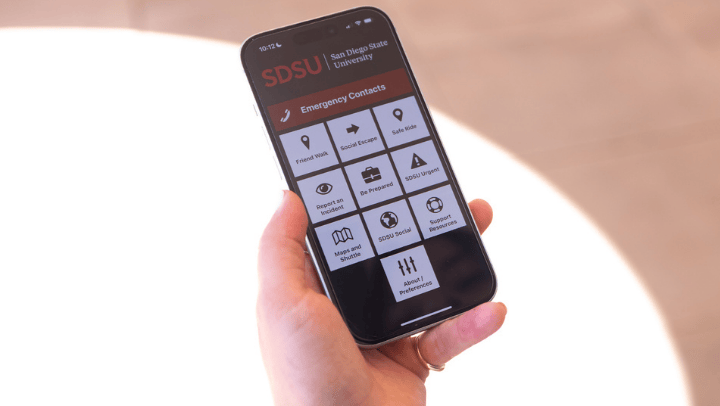Climate Change and Culture Collide in Study Abroad Program
SDSU students studied in Spain this summer to learn about the connections between climate change, health, psychology and business.

Earlier this month, 14 San Diego State University students joined dozens of their peers from Spain and Mexico for a study abroad program at the University of Alcalá de Henares (UAH), just northeast of Madrid, Spain. SDSU students, primarily from the College of Sciences, explored the intersection of climate change, environmental science, public health, psychology and entrepreneurship during the two-week trip, providing invaluable experience for those interested in careers in both science and business.“This, I believe, is the future of higher education, that we must cross boundaries, disciplines and cultures to create a deeper understanding of each other.”
Students from the UAH and Mexico’s Center for Technical and Higher Education (CETYS) studied and worked alongside SDSU students, offering all participants a broad intercultural experience.
“Our students were exposed to both European and Mexican culture,” said Stanley Maloy, dean of the College of Sciences. “They learned from each other different ways to think about the problem of climate change.”
Three faculty members from SDSU taught portions of the courses:
- Maloy and physicist and senior international officer Alan Sweedler lectured on environmental science and health
- Psychologist and provost emerita Nancy Marlin instructed students in the psychology behind climate change denial
- Professor of management and director of the Lavin Entrepreneurship Center Alex DeNoble taught students about environmental entrepreneurship
During the trip, the students stayed in historic dormitories at the UAH. Founded in 1499, it’s one of the oldest universities in Europe. When not studying at the university, the students took field trips to wind farms, forests and entrepreneurship centers to learn how Europeans approach energy, forestry and business management.
The experience concluded with a recognition ceremony in the UAH’s Paraninfo auditorium, an architectural marvel built in 1520. Students were draped with honorary sashes in the same room that the Spanish Ministry of Culture annually awards the country top literary prize, the Miguel de Cervantes Prize.
“This event is unique as far as I know,” said Sweedler during the recognition ceremony. “It’s international, intercultural and interdisciplinary. This, I believe, is the future of higher education, that we must cross boundaries, disciplines and cultures to create a deeper understanding of each other.”



